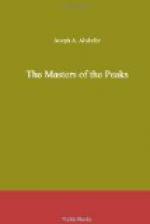“I cannot, Dagaeoga! Why, I am doing it this very instant. Mind! Mind! Did I not tell you to use your mind? O, Dagaeoga, when will you learn the simpler things of life? The Great Bear would not have risked a shot at a wild goose in enemy country, if he had not been very hungry. Otherwise he would have waited until he rejoined the rangers to obtain food. And, having risked his shot, and having obtained his goose, which was the fattest in the flock, he became hungrier than ever. And having risked so much he was willing to risk more in order to complete the task he had undertaken, without which the other risks that he had run would have been all in vain.”
“Tayoga, I can almost believe that you have your dictionary with you in your knapsack.”
“Not in my knapsack, Dagaeoga, but in my head, where yours also ought to be. Ah, here is where the Great Bear began to make preparations to cook his goose! His trail wanders back and forth. He was looking for fallen wood to build the fire. And there, in the little sink between the hills, was where he built it. Even you, Dagaeoga, can see the ashes and burnt ends of sticks. The Great Bear must have been as hungry as a wolf to have eaten a whole goose, and the fattest goose of the flock, too. How do I know he ate it all? Look in the grass and leaves and you will find enough bones to make the complete frame of a goose, and every bone is picked clean. Wild animals might have gleaned on them, you say? No. Here is the trail of a wolf that came to the dip after the Great Bear had gone, drawn by the savory odors, but he turned back. He never really entered the dip. Why? When he stood at the edge his acute and delicate senses told him no meat was left on the bones, and a wolf neither makes idle exertion, nor takes foolish risk. He went back at once. And if the wolf had not come, there is another reason why I knew the Great Bear ate all the goose. He would not have thrown away any of the bones with flesh still on them. He is too wise a man to waste. He would have taken with him what was left of the goose. Having finished his most excellent dinner, the Great Bear looked for a brook.”
“Why a brook?”
“Because he was thirsty. Everyone is thirsty after a heavy meal. He turned to the right, as the ground slopes down in that direction. Even you, Dagaeoga, know that one is more likely to find a brook in a valley than on a hilltop. Here is the brook, a fine, clear little stream with a sandy bottom, and here is where the Great Bear knelt and drank of the cool water. The prints of his strong knees show like carving on a wall. Finding that he was still thirsty he came back for another drink, because the second prints are a little distance from the first.
“Then, after rejoicing over the tender goose and his renewed strength, he suddenly became very cautious. The danger from the warriors, which he had forgotten or overlooked in his hunger, returned in acute form to his mind. He came to the brook a third time, but not to drink. He intended to wade in the stream that he might hide his trail, which, as you well know, Dagaeoga, is the oldest and best of all forest devices for such purposes. How many millions of times must the people of the wilderness have used it!




